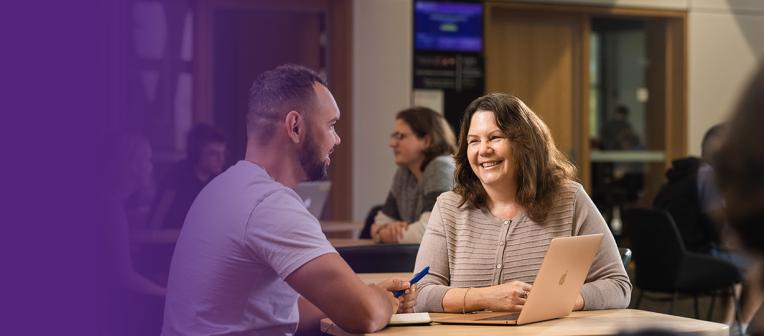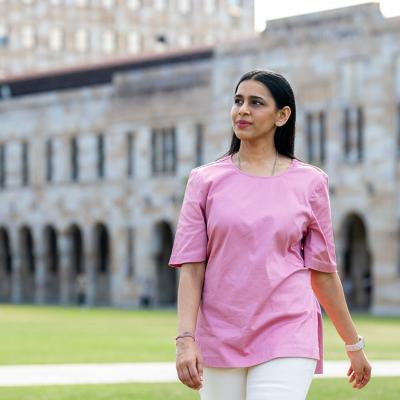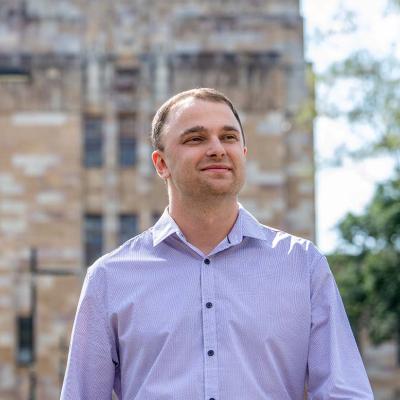It’s a question that plagues undergraduates all over the world as they approach their graduation day. Should I do a postgraduate program? And when should I start thinking about it?
The answer is as soon as possible, according to Master of Writing, Editing and Publishing graduate, Jessica Rowen. We spoke with Jessica about her journey to postgraduate study.
Key information: application deadlines
For most UQ postgraduate programs, applications close on January 31 (for Semester 1) and June 30 (for Semester 2). However, these can vary for some programs, so be sure to check the details in the "How to apply" tab of your desired program's webpage.
What was your experience of applying to postgraduate studies?
When I was in my final semester of my bachelor’s degree, I had no idea what the next step would be. My lack of knowledge about postgraduate options or any sort of forward thinking about my future cost me dearly. I hadn’t truly considered what comes after an undergraduate degree, at least not for myself. So, when I finished my undergraduate degree, I soon after moved abroad and took a job in public relations, only to return home feeling unsure about what I was going to do next.
By the time I realised I wanted to return to do a master’s, I had missed the application cut-off by mere days. And it was another 6 months before I could apply for the next semester.
In some cases, late applications might be accepted. This can't be guaranteed though, so it's always best to get your application submitted on time.
But amid all the chaos and my own uncertainty, there was a silver lining to all my waiting. In those 6 months, I had ample time to consider my options and the future, what I wanted to achieve, and how I wanted to achieve it – everything I hadn’t let myself think on after graduation. I realised postgraduate study truly was the best choice for me because I wanted to pivot from my undergraduate Bachelor of Arts and learn specialised knowledge about the publishing industry by doing a Master of Writing, Editing and Publishing.
As a result, when I finally started my master’s, I was ready to give it my all and work towards something I was passionate about.
“I only wish I had known sooner that a master’s degree or a graduate certificate or diploma was a viable option for me. If I had known, I would’ve spent that final semester content in my choices and armed for the future. Instead, I am embarrassed to say I meandered through those final weeks worried and anxious. There were infinite possibilities within my reach, and I didn’t even know they existed.”
What advice would you give to a future postgrad?
There is a definite lesson to be learned from my mistakes. When you’re nearing the end of your undergraduate program, really sit down and be honest with yourself about what you want to do, and figure out what you need to do to make that happen. Ask yourself: what should I do after graduation?
When should you start thinking about postgraduate study? The answer is simple – during your final semester of undergrad. During this time, you’ll have a better idea of where you want to go and what you’re ready for. No one else can make that decision for you and only you will know what you want to do.
For instance, if you’re unsure about graduating and then going straight into the workforce or feel discontent in your field by the time of graduation, postgraduate study offers a chance to redirect without returning to a bachelor’s degree. I knew I didn’t want to dedicate another 4 years to a degree that wouldn’t teach me the specialised skills that a master’s or a graduate certificate would, and I knew I was ready for that next step.
Now, as I near my next graduation, I know that the skills I’ve learnt at UQ gave me real-world insight.
What grades do I need to get into postgraduate study?
This is dependent on your course content. You may have specific work experience that can count toward your enrolment, or you may need to provide a portfolio of content. I recommend you investigate the specific requirements of your course as soon as you decide and factor this time spent applying into your schedule.

How many units is a master’s degree?
Master’s degrees range from 16-unit to 24-unit programs, with individual courses usually being 2 units each. This means that by doing only 8 to 12 subjects at your own pace, you’re earning a new qualification. For perspective, a bachelor’s degree is 48 units taken over the course of 3 to 4 years. A master’s degree is less than half of this.
“For a lot of people, myself included, a master’s degree is a great choice to promote personal growth. My time at UQ, both for my undergraduate and postgraduate study, has made me the person I am today.”
So, when to apply for postgraduate study?
Take note of the important dates well ahead of time, and don’t leave it to the last minute. Keep a diary or calendar and set yourself a realistic timeframe to apply for a postgraduate degree.
Important dates for applying at UQ generally follow each semester. For the first semester of each year, the end of January* is usually the final date to apply. For second semester, applications tend to close at the end of June*. But I recommend submitting your application as soon as you think it’s what you want to commit to. Remember: you can always withdraw if something comes up, but it's not so easy to apply after the cut-off date.
*Certain programs may have different closing dates. You can check the "How to apply" tab on each program page to confirm the important dates.
Ready to start your postgraduate journey? Find your program.







